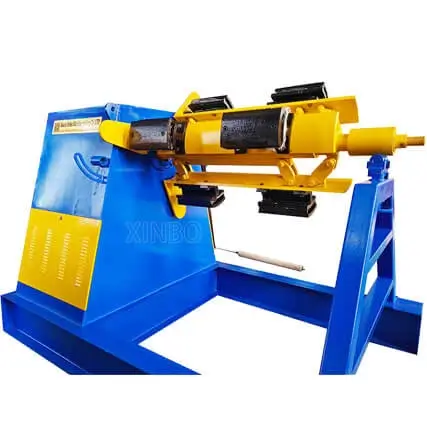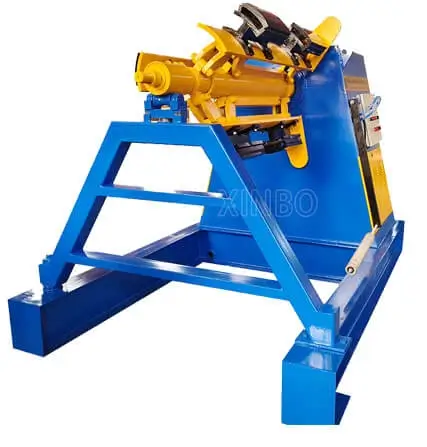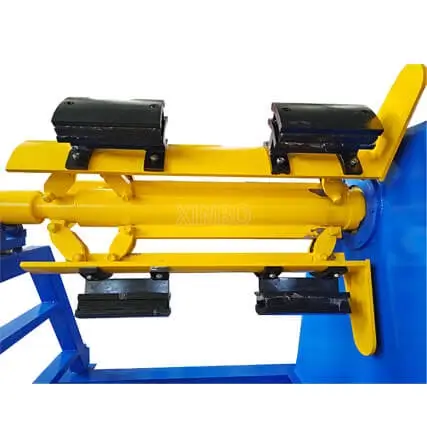Good quality
XinBo machine making CO. LTD is a professional manufacturer and exporter in roll forming machine,
VIEW MORE→A hydraulic decoiler machine is a vital tool in today’s factory settings. It supports heavy metal rolls by securing and unwinding them gently. This makes it simpler to feed them into machines for shaping, slicing, or pressing. The device uses a hydraulic system. This system drives a central rod or mandrel. The mandrel holds and spins the roll.
This process is key in fields that handle flat metal, such as car making, building supplies, and home device production. The importance of hydraulic decoiler in industrial processes comes from its ability to cut down on handwork, protect materials from harm, and provide a steady and dependable metal flow to other machines. Without this equipment, handling rolls would be sluggish, risky, and ineffective.

In fast-paced fields like car production, construction, and metal crafting, managing roll materials swiftly and safely is a major goal. Old-fashioned methods or aging equipment often cause delays, mistakes by workers, and even injuries. These approaches also result in uneven feeding. This can harm the quality of the final product.
Here, the advantages of using a hydraulic decoiler machine shine through. With automatic hydraulic decoiler systems, tasks become quicker, more reliable, and less dependent on workers. These devices are built to manage big and heavy rolls. Handling these by hand would be tough. By speeding up roll feeding and cutting downtime, companies boost output and reduce running costs.
A hydraulic decoiler machine usually has four main parts: the hydraulic system, mandrel, motor, and control board. Each part is crucial. The hydraulic system enables the mandrel to expand or shrink. This lets it firmly hold rolls of various sizes. The motor supplies the power to rotate and unwind the roll. Meanwhile, the control board lets the operator adjust speed, direction, and tightness.
Xinbo’s hydraulic decoiler machines are famous for their cutting-edge designs. They feature improved parts that enhance dependability and reduce wear. Xinbo uses CNC machining in making each unit. This ensures lasting quality. With these traits, Xinbo’s machines help users manage rolls more safely and accurately.

Many industries now rely on automatic hydraulic decoiler systems with adjustable settings. This automation simplifies controlling how quickly the roll unwinds. It also ensures the sheet feeds smoothly into the next device. Plus, it prevents problems like looseness or sudden tightness. These issues could cause the material to jam or get damaged.
Automation boosts the reliability of the process. It also cuts down on human mistakes. This is vital in high-output settings where accuracy matters. With automatic controls, users can tweak the machine to match the roll’s size and thickness. The outcome is better results and smoother operations. This again shows the importance of hydraulic decoiler in industrial processes.
Running a hydraulic decoiler machine is straightforward but needs caution. First, a crane or forklift loads the roll onto the mandrel. Then, the mandrel expands hydraulically. This grips the roll securely. Once the roll is set, the operator starts the machine via the control board. As the motor spins, the roll begins to unwind. The sheet moves forward to the next stage.
The hydraulic system keeps steady tightness. This ensures the sheet stays straight and doesn’t buckle or twist. This control is especially helpful in fast-paced shaping or pressing lines. By managing speed and tightness automatically, the hydraulic decoiler machine keeps the whole production line running smoothly.
Xinbo knows that rolls vary. Some are large and heavy. Others are thin and light. That’s why Xinbo offers tailored solutions. Whether your work involves slicing, cutting, or pressing, Xinbo can modify the machine’s design to meet your exact needs.
For instance, Xinbo has built special decoilers for fields using coated steel or aluminum. These ensure delicate materials stay undamaged during unwinding. This ability to customize highlights why flexible roll-handling equipment is critical. It’s another reason why picking the right hydraulic decoiler machine is key.

Hydraulic decoilers are far quicker than manual roll handling. They cut downtime, speed up feeding, and keep materials moving steadily. This shortens production time and boosts output significantly.
Real-world plants have seen huge gains by switching to automatic hydraulic decoiler systems. Instead of pausing to adjust rolls by hand, the machines run with little oversight. This is a major advantage of using a hydraulic decoiler machine: speed without losing quality.
Handling heavy metal rolls is risky if not done right. Hydraulic decoiler machines include safety tools like emergency stop switches, automatic tightness controls, and limit sensors. These protect workers and reduce accidents.
Fewer manual tasks also mean fewer workers are needed for roll handling. This lowers labor costs. It also lets staff focus on other key parts of the production line. Xinbo prioritizes safety. They perform three rounds of quality checks on every unit to ensure safe use.
A quality hydraulic decoiler machine is a long-term asset. Xinbo’s machines are crafted in a China hydraulic decoiler machine factory. The factory uses in-house CNC machining. This ensures better control over quality and less reliance on outside suppliers.
These machines last longer and need less upkeep. They also perform well under tough conditions. Their efficient design makes them easy to ship, even in containers. This cuts shipping costs for buyers worldwide.
Hydraulic decoiler machines are used in many fields. In roll shaping, they feed steel strips into forming devices. In pressing, they ensure a steady material supply to presses. In slicing lines, they unwind wide rolls so sheets can be cut into narrower strips.
They are especially valuable in sectors like car manufacturing, HVAC systems, and home device production. In each case, the importance of hydraulic decoiler in industrial processes is evident. It helps companies scale up without losing control over quality or speed.
For plants producing at high speed, hydraulic decoilers are vital. They can hold and unwind large rolls weighing several tons without slowing down. Xinbo’s machines are built to handle this demand while maintaining steady performance.
Many clients in heavy industry rely on Xinbo’s hydraulic decoiler machine to meet growing production needs. These machines allow factories to work faster with less downtime and fewer issues. This proves their value in high-output settings.
Xinbo has over 20 years of experience in making hydraulic decoilers. Every machine is built in-house using modern tools and CNC equipment. From start to finish, the process ensures top quality.
Xinbo also offers ODM services. This means they can design unique machines based on your specific needs. This flexibility and focus on detail set Xinbo apart from other makers.
Since Xinbo handles everything in-house, they deliver machines faster than other suppliers. Their efficient process reduces wait times. This helps clients meet tight deadlines.
They also offer fair pricing without compromising quality. By controlling production costs, Xinbo makes it affordable for businesses to upgrade their equipment. This lets them gain the advantages of using a hydraulic decoiler machine.
Ready to improve your roll handling process? Discover how a hydraulic decoiler machine can unlock new levels of efficiency for your production line. Contact Xinbo today for expert advice and custom solutions tailored to your needs!
Don’t let outdated roll handling slow you down. Reach out to our team at Xinbo to explore how our China hydraulic decoiler machine factory can design the perfect automatic hydraulic decoiler for your business.
Curious about the advantages of using a hydraulic decoiler machine? Email us at Xinbo to learn how our innovative designs can boost your productivity and save costs!

XinBo machine making CO. LTD is a professional manufacturer and exporter in roll forming machine,
VIEW MORE→

